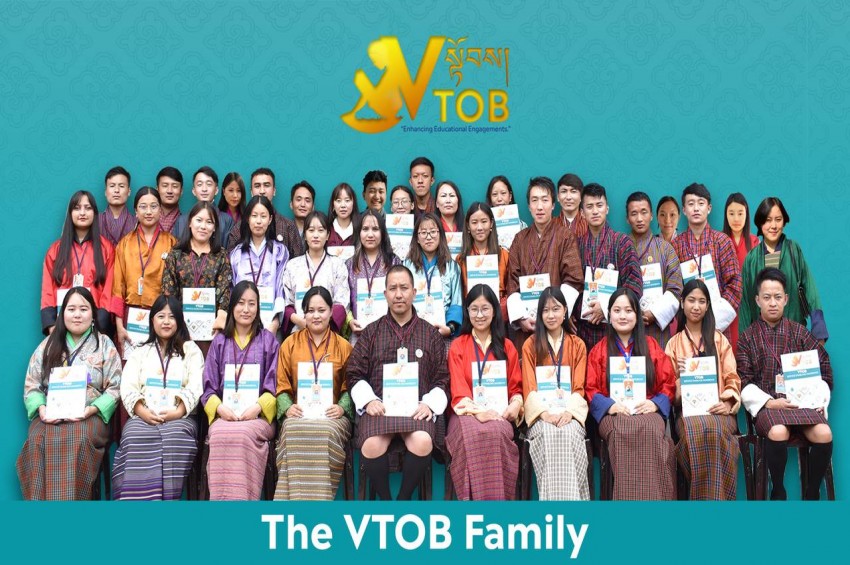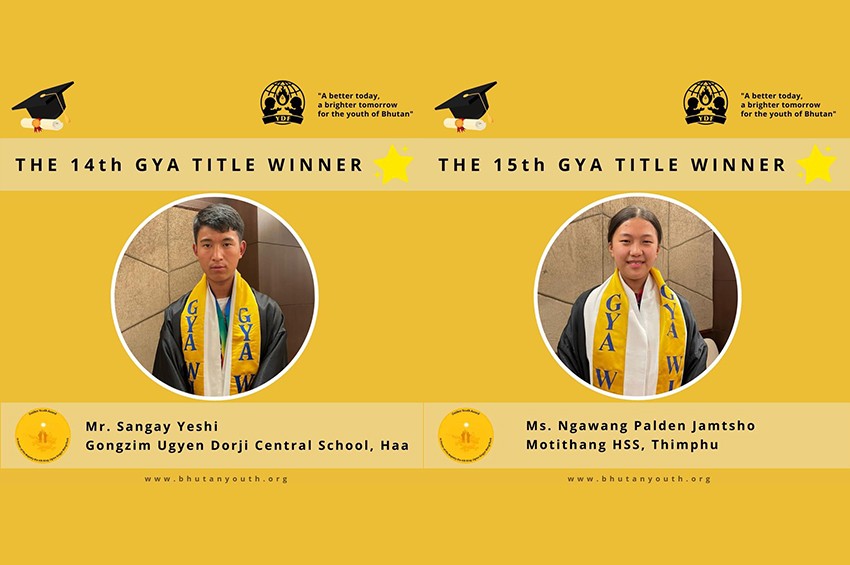Happiness and well-being centers have been established across the colleges under the Royal University of Bhutan (RUB) to address mental health issues for the well-being of the students.
Almost every year, we learn that some students have taken a desperate measure to the extent of dying by suicide and many attempted cases. However, many cases remain buried without making it to the count of national data and statistics.
Similarly, the well-being centers are hardly used by the students. Students shy away from availing the services instituted for them.
Wellness centers instituted all across the RUB colleges provide services such as one-on-one counseling, group counseling, and yoga and mindfulness sessions and more. But only a handful of students utilize the services.
Counselor Jigme in College of Natural Resources (CNR) said, “Only a handful of students have come forth for counseling.”
The counselor also claimed that they are not full-time counselors. But the counselors were trained and certified by the Bhutan Board of Certified Counselors (BBCC).”
Jigme said, “Also because of contradictory job positions, very few approached and availed counseling.”
He claimed that the reason must be because he serves as the Student Service Officer (SSO) apart from the counselling job at the same time. “But those who came in here have been helped,” he added.
Most of the students who reached out to the counselors seem to have poor mental health fueled by relationship issues.
Likewise, Sherubtse College in Kanglung has one of the earliest mental well-being facilities built in 2016. According to statistics shared by the counselors of Sherubtse, from the year 2017 till date, so far, only 338 students came to seek counseling services.
The highest record of counseling services sought by students was 78 students in 2017 with the lowest in 2019 with 33 students. The numbers of students seeking mental wellbeing services were observed to be dropping every year.
Sonam, the counselor of Sherubtse said, “All RUB colleges do not have separate counselors. Our primary job is being the SSO which is about discipline, welfare, and sports. SSO and counseling contradicts.”
“There is a role conflict between SSO. SSO’s normally punish students and inculcate discipline. Whereas as a counselor, we need to be flexible and approachable,” explained Sonam.
“I feel that is the reason that students are hesitant to approach us,” added the counsellor.
According to an online survey done by Tshering in 2020, when she was in Sherubtse, it was found that 75.1% of the students struggled with mental health problems but were hesitant to approach counselors.
“Students fear judgment and mistrust counselor’s credibility as the major reason,” stated the survey.
Tshewang, the former coordinator to YPEER at Sherubtse claimed to have provided peer counseling. The peers claimed that another reason why most of the students don’t go for counseling is because they mistrust the professional conduct of the counselors in the first place.
“Students hold the view that those who go for aid or assistance will spill the beans and therefore put them in a situation where they face judgments and prejudices,” said Tshewang.
Another reason was because the students are unaware of how crucial it is to be open up about what is bothering them.
Tshewang added, “Sharing about one’s shortcomings is often perceived as a sign of weakness and therefore they are dissuaded even to be open about their mental health.”
“I think students are more comfortable with peer counseling. From my personal experience, I have had people coming to me with issues and these issues are sometimes very intense and complicated. Students feel comfortable with someone their age because they feel that they can empathize with their situations, and can relate to them. My friends from other colleges are all seeking peer-to-peer assistance instead of going to counselors”, he added.
Sangay, the coordinator of the project that instituted the happiness and well-being center also added some points on the underutilization of the services.
“Cultural dynamics of the country also play a vital role. We have a habit of seeking help from our friends, family, and relatives rather than going to professionals,” he said
“Definitely the reservations and prejudices on counseling and also the unawareness surrounding it, results in stagnant service flow,” added Sangay.
The students of Jigme Namgyal Engineering College (JNEC) in Dewathang were unaware of the existence of such facilities called happiness and well-being center and its counseling services available at their campus.
A student said, “I don’t think we have a happiness and well-being center here. I don’t face problems that require counseling and even if I do face some issues, I usually have my friends whom I talk to.”
Sangay said, “Usually we do talk about the center during the orientation program and we push the center managers to disseminate the information.”
“It seems like it’s partly the institutions’ fault and partly the students’ fault. We need to push aggressively and reach out and at the same time, the students should do their part and check it out,” he said.
The happiness and well-being centers were instituted with the funding from the Erasmus Programme from the European Union.
“These past two years, the centers were funded by the European Union which helped reinforce the services. However, the project has been phased out for about seven months so the centers are managed by their respective colleges. It was quite active before it phased out,” he added.
Almost every year, we learn that some students have taken a desperate measure to the extent of dying by suicide and many attempted cases. However, many cases remain buried without making it to the count of national data and statistics.
Similarly, the well-being centers are hardly used by the students. Students shy away from availing the services instituted for them.
Wellness centers instituted all across the RUB colleges provide services such as one-on-one counseling, group counseling, and yoga and mindfulness sessions and more. But only a handful of students utilize the services.
Counselor Jigme in College of Natural Resources (CNR) said, “Only a handful of students have come forth for counseling.”
The counselor also claimed that they are not full-time counselors. But the counselors were trained and certified by the Bhutan Board of Certified Counselors (BBCC).”
Jigme said, “Also because of contradictory job positions, very few approached and availed counseling.”
He claimed that the reason must be because he serves as the Student Service Officer (SSO) apart from the counselling job at the same time. “But those who came in here have been helped,” he added.
Most of the students who reached out to the counselors seem to have poor mental health fueled by relationship issues.
Likewise, Sherubtse College in Kanglung has one of the earliest mental well-being facilities built in 2016. According to statistics shared by the counselors of Sherubtse, from the year 2017 till date, so far, only 338 students came to seek counseling services.
The highest record of counseling services sought by students was 78 students in 2017 with the lowest in 2019 with 33 students. The numbers of students seeking mental wellbeing services were observed to be dropping every year.
Sonam, the counselor of Sherubtse said, “All RUB colleges do not have separate counselors. Our primary job is being the SSO which is about discipline, welfare, and sports. SSO and counseling contradicts.”
“There is a role conflict between SSO. SSO’s normally punish students and inculcate discipline. Whereas as a counselor, we need to be flexible and approachable,” explained Sonam.
“I feel that is the reason that students are hesitant to approach us,” added the counsellor.
According to an online survey done by Tshering in 2020, when she was in Sherubtse, it was found that 75.1% of the students struggled with mental health problems but were hesitant to approach counselors.
“Students fear judgment and mistrust counselor’s credibility as the major reason,” stated the survey.
Tshewang, the former coordinator to YPEER at Sherubtse claimed to have provided peer counseling. The peers claimed that another reason why most of the students don’t go for counseling is because they mistrust the professional conduct of the counselors in the first place.
“Students hold the view that those who go for aid or assistance will spill the beans and therefore put them in a situation where they face judgments and prejudices,” said Tshewang.
Another reason was because the students are unaware of how crucial it is to be open up about what is bothering them.
Tshewang added, “Sharing about one’s shortcomings is often perceived as a sign of weakness and therefore they are dissuaded even to be open about their mental health.”
“I think students are more comfortable with peer counseling. From my personal experience, I have had people coming to me with issues and these issues are sometimes very intense and complicated. Students feel comfortable with someone their age because they feel that they can empathize with their situations, and can relate to them. My friends from other colleges are all seeking peer-to-peer assistance instead of going to counselors”, he added.
Sangay, the coordinator of the project that instituted the happiness and well-being center also added some points on the underutilization of the services.
“Cultural dynamics of the country also play a vital role. We have a habit of seeking help from our friends, family, and relatives rather than going to professionals,” he said
“Definitely the reservations and prejudices on counseling and also the unawareness surrounding it, results in stagnant service flow,” added Sangay.
The students of Jigme Namgyal Engineering College (JNEC) in Dewathang were unaware of the existence of such facilities called happiness and well-being center and its counseling services available at their campus.
A student said, “I don’t think we have a happiness and well-being center here. I don’t face problems that require counseling and even if I do face some issues, I usually have my friends whom I talk to.”
Sangay said, “Usually we do talk about the center during the orientation program and we push the center managers to disseminate the information.”
“It seems like it’s partly the institutions’ fault and partly the students’ fault. We need to push aggressively and reach out and at the same time, the students should do their part and check it out,” he said.
The happiness and well-being centers were instituted with the funding from the Erasmus Programme from the European Union.
“These past two years, the centers were funded by the European Union which helped reinforce the services. However, the project has been phased out for about seven months so the centers are managed by their respective colleges. It was quite active before it phased out,” he added.

















